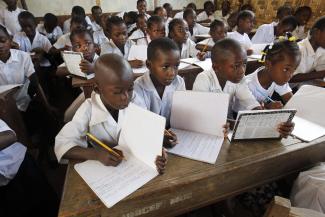Primary schools
Public is waiting for government report

Liberian schools have been in a very bad shape for a very long time. Extended civil war compounded the problems, and rebuilding public infrastructures afterwards proved difficult in spite of considerable donor funding.
In 2016, the administration of President Ellen Johnson Sirleaf decided to outsource government schools to the International Bridge Academies, a private-sector company based in the USA. Due to public outcry over the outsourcing to a single institution, the government later also gave assignments to other private non-governmental education providers, including the Omega chain and the international NGO Brac. Bridge remains the government’s most important partner and has attracted the most attention.
Bridge is supported by the Gates Foundation, the World Bank subsidiary IFC (International Finance Corporation), the British government and other international donors. The low-cost business model is controversial. It relies on a standardised curriculum for all countries. Teachers are advised to use tablet computers to structure their lessons, and the tablets also serve Bridge to monitor their work. The educators therefore have very little scope for individual interaction with pupils. Many teachers do not have academic degrees themselves (see Alphonce Shiundu in D+C/E+Z e-Paper 2019/05, Focus section).
In Liberia, the public-private partnership (PPP) in the education sector was initially called the Partnership Schools for Liberia (PSL) and was supposed to run for three years. In 2016, 93 schools were outsourced to private providers. The number has since increased to more than 200.
Initial monitoring suggested that the programme was running well and that pupils were learning more. At the same time, it was noted that funding for PSL schools was better than for other government schools. As the parents who send children to the schools concerned do not pay fees, the outsourced schools depend on money from donors and the government. The irony is that the government budget also depends on donor contributions.
The government is yet to release a full report assessing performance. It is now run by Johnson Sirleaf’s successor, President George Weah, who won the elections in 2017. The new administration has committed to extending the programme for at least one more year and has renamed it LEAP (Liberia Education Advancement Program). So far, however, it is largely shying away from discussing the LEAP performance publicly. In spite of several requests for this article, I was not given relevant information.
It was similarly impossible to get official information from Bridge. Neither the company’s Liberian office nor the staff of individual schools were prepared to answer my questions. The exception was one school principal, who, however, did not want to be named. According to him, nothing much has changed in the school that he has been heading for over a decade. “I can’t see anything new, but we are still watching to see what will happen in the future,” he said.
In the eyes of civil-society activists, the PSL/LEAP approach has failed. “This project needs to stop,” says Anderson Miamen of the independent Center for Transparency and Accountability in Liberia (CENTAL). “We need a more holistic approach to solving the problems in the education sector.”
In his eyes, the funding of all government schools must improve and the district education officers must be empowered to manage schools properly and monitor the performance. He adds that only local ownership will make schools more inclusive, so local stakeholders should be involved.
Miamen claims to have assessed several Bridge schools across the country and to have found them inadequate. In his view, the Liberian experience confirms the international trend of private education only making a marginal difference at best.
Samwar S. Fallah is a Liberian journalist.
samwarfallah@gmail.com









